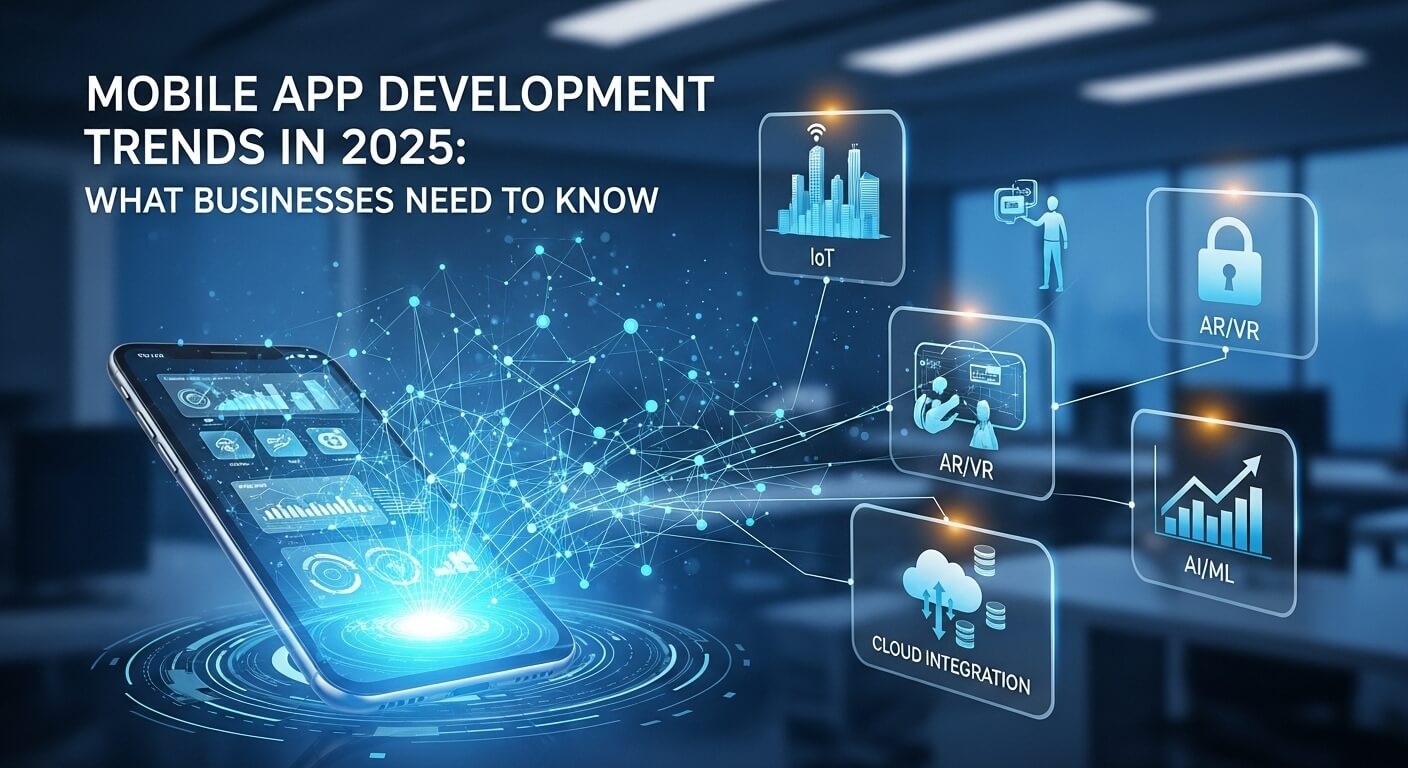Introduction
In 2025, mobile app development trends are reshaping how businesses connect with customers, enhance user experiences, and drive digital transformation. With billions of smartphone users worldwide and mobile commerce accounting for a major share of digital revenue, apps are no longer a luxury—they’re a necessity. From AI-powered personalization and 5G-enabled experiences to cross-platform development, progressive web apps (PWAs), and voice-enabled applications, the future of mobile apps is faster, smarter, and more secure. For businesses, understanding these innovations is the difference between staying competitive or falling behind. Let’s explore the biggest mobile app development trends of 2025 and what they mean for businesses.
The Evolution of Mobile App Development
Over the past decade, mobile apps have transformed from simple tools into powerful ecosystems driving industries. In 2010, apps were largely limited to basic utility and entertainment functions. By 2020, apps powered by AI, cloud computing, and IoT had revolutionized sectors like healthcare, finance, and e-commerce.
Now, in 2025, mobile apps are the core of digital-first business strategies. Consumer expectations have skyrocketed: users demand faster performance, personalized experiences, and secure transactions. This has pushed businesses to invest in innovative app development strategies to meet changing needs.
The evolution shows one clear pattern: companies that adopt new mobile app technologies early often dominate their industries.
Key Mobile App Development Trends in 2025
- AI and Machine Learning Integration
AI and machine learning are no longer optional—they’re embedded in nearly every successful app. Businesses use AI to provide hyper-personalized recommendations, predictive analytics, and intelligent chatbots that improve customer engagement.
- Examples:Netflix uses AI for personalized content recommendations; e-commerce apps use AI to suggest products based on browsing history.
- Business Impact:Better engagement, higher conversions, and improved retention.
- 5G-Enabled Mobile Apps
The global rollout of 5G has unlocked new opportunities for mobile applications. With faster speeds, ultra-low latency, and improved connectivity, apps in 2025 deliver smoother user experiences.
- Applications:Real-time gaming, HD video streaming, and immersive AR/VR experiences.
- Business Impact:Businesses can now build data-intensive apps without worrying about lag or performance.
- Cross-Platform Development
Frameworks like Flutter and React Native have made cross-platform development mainstream. In 2025, businesses increasingly choose this approach for faster deployment and reduced costs.
- Benefits:Single codebase for iOS and Android, reduced development costs, and quicker time-to-market.
- Example:Startups can launch feature-rich apps without separate iOS/Android teams.
- Progressive Web Apps (PWAs)
PWAs combine the best of websites and native apps. In 2025, PWAs are popular for businesses wanting to reach users without forcing downloads.
- Features:Offline usage, faster loading, push notifications.
- Business Case:Retailers like Starbucks and Alibaba use PWAs to enhance customer reach.
- AR & VR Applications
AR and VR are transforming industries in 2025 by creating immersive, interactive experiences.
- Applications:Virtual try-ons in fashion, AR-assisted learning in education, VR simulations in healthcare.
- Market Growth:Global AR/VR app revenue expected to cross $200 billion in 2025.
- IoT-Powered Mobile Apps
The Internet of Things (IoT) enables mobile apps to control smart devices like wearables, cars, and home appliances.
- Examples:Smart home apps (Nest), fitness trackers, healthcare monitoring apps.
- Challenge:Data privacy and security remain critical concerns.
- Enhanced App Security
With cybercrime on the rise, app security is now a development priority. In 2025, businesses integrate:
- Biometric authentication(face ID, fingerprint).
- End-to-end encryptionfor data safety.
- Blockchain technologyfor secure transactions.
- Voice Technology and Voice Search
Voice assistants like Alexa, Siri, and Google Assistant are influencing mobile app development. By 2025, voice-enabled apps are mainstream, making digital services more accessible.
- Use Cases:Hands-free banking, food ordering, healthcare appointment booking.
- SEO Impact:Businesses optimize apps for voice search queries.
- Super Apps
Super apps combine multiple services in a single platform, inspired by WeChat and Grab.
- Features:Messaging, shopping, payments, ride-hailing—all in one app.
- Trend in 2025:Businesses develop multi-service apps to boost engagement and retention.
- Sustainability and Green Apps
Consumers in 2025 demand eco-friendly, sustainable apps that minimize energy consumption.
- Features:Dark mode to reduce power usage, optimized code for efficiency.
- Impact:Businesses that adopt green tech gain consumer trust.
Emerging Technologies in Mobile App Development
Beyond the mainstream trends, businesses must also track emerging innovations shaping app development:
- Blockchain:Secure payments, supply chain transparency, identity verification.
- Edge Computing:Faster real-time processing for IoT and AI apps.
- AI-Powered Testing:Automated bug detection for quicker app launches.
These innovations may still be early-stage, but they will be critical differentiators by 2030.
Industry-Specific Mobile App Trends in 2025
Healthcare Apps
- AI diagnosis, telemedicine, fitness tracking.
- Patient monitoring through IoT-enabled wearables.
E-commerce Apps
- Personalized recommendations.
- One-click checkout with digital wallets and cryptocurrencies.
Finance Apps
- AI-driven robo-advisors.
- Blockchain for secure transactions.
Education Apps
- Gamification for student engagement.
- AR/VR classrooms for immersive learning.
Challenges in Adopting New Trends
-
While the opportunities are massive, businesses face challenges:
- High Development Costs:Advanced features like AI and AR require investment.
- Technology Shifts:Rapid innovation makes it hard to stay updated.
- Security & Compliance:Data privacy laws like GDPR and HIPAA add complexity.
- User Adaptability:Not all consumers adapt to new technology immediately.
How Businesses Can Prepare for 2025 Mobile App Trends
- Invest in AI & Automation:For personalization and analytics.
- Hire Experienced Developers:Skilled teams can implement cutting-edge features.
- Focus on Scalability:Build apps that can adapt to future needs.
- Security First:Prioritize secure coding and compliance with global laws.
Case Studies: Businesses Leveraging App Trends Successfully
- Retail:Starbucks’ PWA increased daily active users significantly.
- Healthcare:Teladoc expanded virtual consultations via AI-based apps.
- Finance:PayPal integrated biometric authentication for secure transactions.
The Future of Mobile Apps Beyond 2025
- Looking ahead, the next wave of mobile apps could include:
- AI-first appsthat predict needs before users’ act.
- Holographic interfacespowered by AR/VR.
- Web3 and decentralized apps (dApps)for security and transparency.


